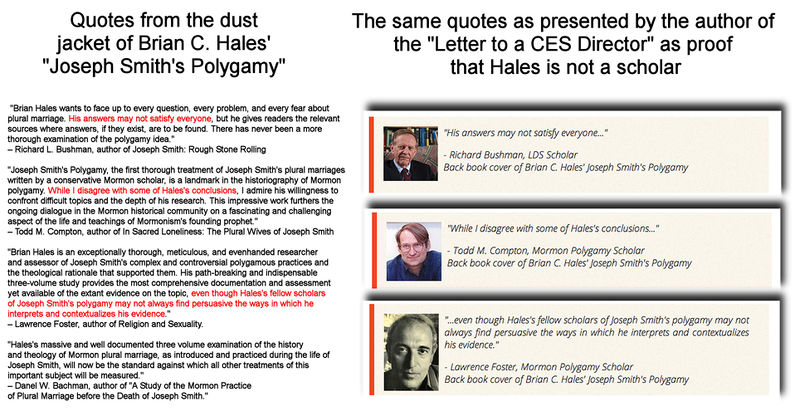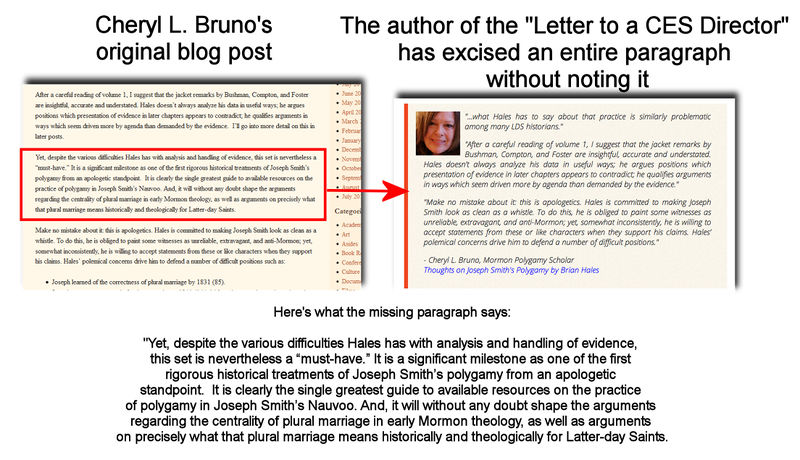
FAIR is a non-profit organization dedicated to providing well-documented answers to criticisms of the doctrine, practice, and history of The Church of Jesus Christ of Latter-day Saints.
< Mormonism and apologetics | "ad hominem" | Case study
Hales is not a scholar. He's an anesthesiologist who hired Don Bradley to do his research for him. He then wrote 3 books using his employee's homework. Author? Sure. Apologist? Yes. Amateur? Yes. Scholar? No. He's an apologist disguising himself as a scholar. The real scholars in the field of polygamy have issues with many of Hales' conclusions and interpretations. Anyone with big bucks and writing skills can do what Brian did. All you have to do is hire guys like Don Bradley to do all the work for you and then you throw the stuff in a nice hardcover book with your name on it.
—Jeremy Runnells, author of the "Letter to a CES Director"[1]
Quote mining: Quote mining is the deceitful tactic of taking quotes out of context in order to make them seemingly agree with the quote miner's viewpoint or to make the comments of an opponent seem more extreme or hold positions they don't in order to make their positions easier to refute or demonize.
—RationalWiki [2]

Brian Hales has published numerous works on the subject of Joseph Smith's polygamy. His three-volume work, Joseph Smith's Polygamy, contains every known primary source related to Joseph Smith's practice of plural marriage.
According to Merriam-Webster, "ad hominem" is "marked by or being an attack on an opponent's character rather than by an answer to the contentions made." Note how the critic, who has not read, cited or engaged Hales' work in any way whatsoever, attempts to dismiss him as a scholar because he works as an anesthesiologist. What the critic is claiming is that one cannot be a scholar and an anesthesiologist, and that being an anesthesiologist somehow disqualifies one from performing scholarly endeavors.
Also note that Todd Compton, in one of the quotes that the critic "quote mined" to demonstrate Hales' lack of scholarly credentials, actually refers to Hales as a "conservative Mormon scholar."
The critic also states that Hales didn't even do the work himself. Again, this is an attack on his character which has absolutely nothing to do with Hales' research.
All scholars employ research assistants to do the work of looking up primary sources. This is standard operating procedure for any scholar. The critic re-frames this common practice as the employer taking the work of someone else as their own. Hales' research assistant at the time, Don Bradley, is a competent and capable historian in his own right. Every historian spends time as a research assistant at some point in their early career.
The critic sets up a mutual exclusion between "apologist" and "scholar," however, he takes it a step further by implying dishonesty in that Hales is actually one thing while "disguising" himself as something else. Once again, the critic is attacking character based upon some undefined criteria (he is an "apologist," whatever that means) and stating that he cannot therefore be a "scholar."
The critic now mentions "real" scholars, thus once again indicating that the target of his comment is not a "real" scholar. The critic mentions that the "real" scholars "have issues with many of Hales' conclusions and interpretations." No data is provided regarding who these "real" scholars are, and which "conclusions and interpretations" they disagree with. Who are the "real scholars?" D. Michael Quinn? Dan Vogel? Todd Compton? Where have they published their rebuttals of Hales?
A "scholar" is defined as "A person who has studied a subject for a long time and knows a lot about it: an intelligent and well-educated person who knows a particular subject very well." (Merriam-Webster.com) and "A specialist in a particular branch of knowledge. A learned person; a bookman." (Wiktionary.com)
Perhaps Runnells is incorrectly conflating "scholar" with "professor" who teaches at a university. Yet he seems to accept evidence from scholars who have never been university professors, including Fawn Brodie, George D. Smith and Grant Palmer.
It seems more likely that Mr. Runnells prefers to dismiss Brian Hales and his work by calling him an "apologist," while reserving the title "scholar" for people who agree with him.
The critic now attempts to further diminish Hales' reputation as a scholar by bringing a new element into the criticism: He must have simply thrown around some "big bucks" to get his research done and his books published. The critic indicates that Don Bradley did all of the actual work and that the process of putting together a three-volume series of books was little more than "throwing stuff together." Real scholars use research assistants because it lets them find even more valuable sources. The fact that Hales used his own money to broaden his research shows just how thorough and serious he is about it.
Note once again that the critic accuses Hales of essentially taking Bradley's work and publishing it.
The critic removes a paragraph from a blog post by Cheryl Bruno because it praises Hales' work, while retaining critical paragraphs both before and after it. [3]

Here is how the blog post originally read before it was altered by the editor of the "Letter to a CES Director". The section originally removed by the critic without the use of ellipses is in blue:
After a careful reading of volume 1, I suggest that the jacket remarks by Bushman, Compton, and Foster are insightful, accurate and understated. Hales doesn’t always analyze his data in useful ways; he argues positions which presentation of evidence in later chapters appears to contradict; he qualifies arguments in ways which seem driven more by agenda than demanded by the evidence. I’ll go into more detail on this in later posts.
Yet, despite the various difficulties Hales has with analysis and handling of evidence, this set is nevertheless a “must-have.” It is a significant milestone as one of the first rigorous historical treatments of Joseph Smith’s polygamy from an apologetic standpoint. It is clearly the single greatest guide to available resources on the practice of polygamy in Joseph Smith’s Nauvoo. And, it will without any doubt shape the arguments regarding the centrality of plural marriage in early Mormon theology, as well as arguments on precisely what that plural marriage means historically and theologically for Latter-day Saints.
Make no mistake about it: this is apologetics. Hales is committed to making Joseph Smith look as clean as a whistle. To do this, he is obliged to paint some witnesses as unreliable, extravagant, and anti-Mormon; yet, somewhat inconsistently, he is willing to accept statements from these or like characters when they support his claims. Hales’ polemical concerns drive him to defend a number of difficult positions such as... [3]
Notes

FAIR is a non-profit organization dedicated to providing well-documented answers to criticisms of the doctrine, practice, and history of The Church of Jesus Christ of Latter-day Saints.
We are a volunteer organization. We invite you to give back.
Donate Now